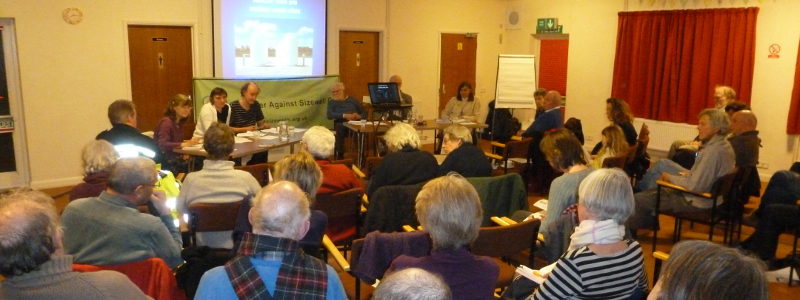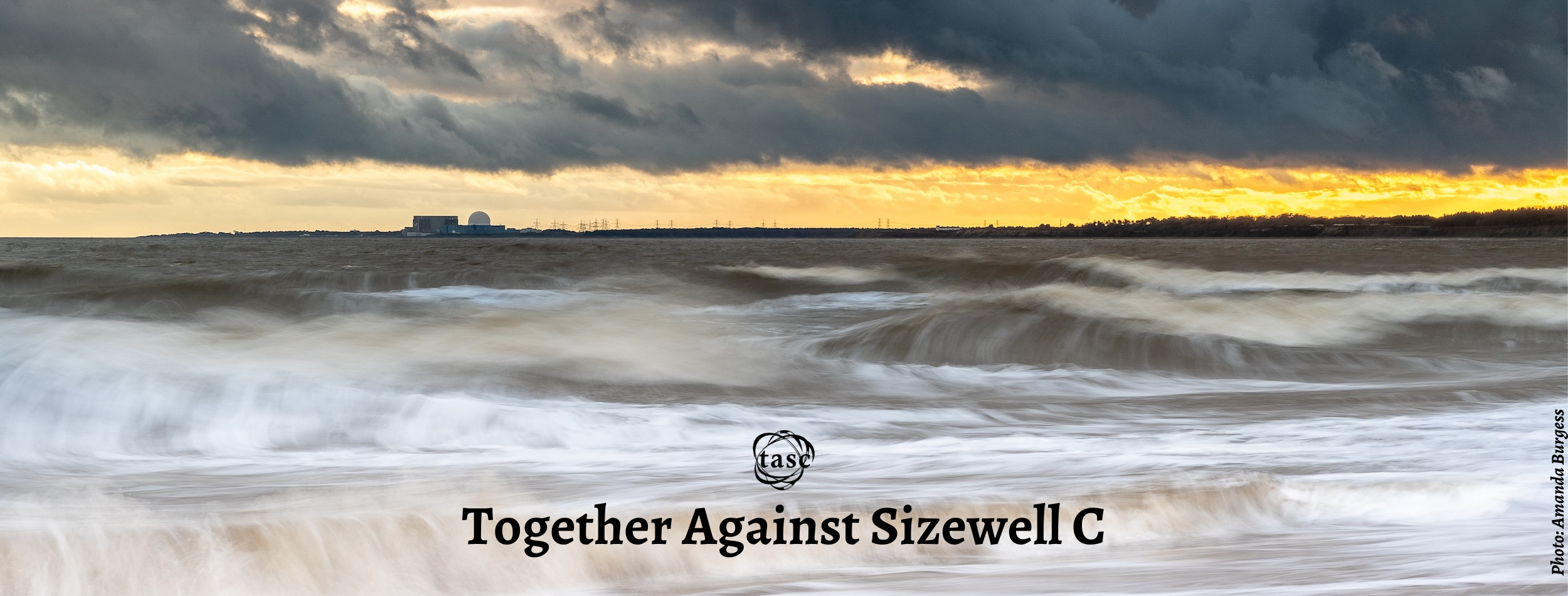
At another packed public meeting TASC (Together Against Sizewell C) hosted guests from the United States: Paul and Linda Gunter from the organisation ‘Beyond Nuclear’ whose aim is to work for a world free of nuclear power and nuclear weapons.
Paul Gunter specializes in reactor hazards and security of operating reactors; prevention of new reactor construction; regulatory oversight; climate change; the nuclear power-nuclear weapons connection.
Linda Pentz Gunter specializes in international nuclear issues. She also serves as director of media and development. Linda’s work focuses on the nuclear power-nuclear weapons connection; wildlife impacts; nuclear France; and uranium mining and human rights.
The meeting held at Leiston Community Centre was chaired by Rachel Fulcher, of ‘Suffolk Coastal Friends of the Earth’ and comprised of three sections:
- Sizewell B/ Nuclear safety issues/ Flamanville in France
- Radioactive Waste/Storage
- Fukushima, mistakes learnt/defeating Sizewell C
‘We Share Your Concerns’
Concerning the plans for Sizewell C, Paul began by saying ‘we share your concerns’. He said that protests in America have resulted in the State of Vermont concluding that ‘nuclear is no longer for the public good’ and a similar view is being adopted in New York, where the Governor has stated his opposition to nuclear power. He talked about ‘major risks particularly in relation to underground buried pipes’ which he said ‘cannot be inspected and which lack structural integrity as the pipework loses its strength’. He said that ‘this is a big issue in the United States with the potential of leaks of radioactive water’. He said that unlike the UK, the United States’ ‘Atomic Energy Act’ prevents a nuclear power station being owned by a foreign entity.
‘Disastrous Nuclear Project’
Linda Pentz Gunter talked about the French nuclear reactor at Flamanville stating that it is a ‘disastrous EPR Project with a price tag that has grown from 1.8 billion Euros in 1998 to 8.5 billion Euros today’. She said ‘in France there is a surprisingly large anti nuclear movement and even in Flamanville they could bring out 800 protestors”
Emma Bateman from TASC then talked about the flawed ‘General Design Assessment’ (GDA) process at Sizewell C which she said ‘has been prematurely signed off due to immense time pressures resulting in an interim design assessment being agreed despite many unresolved problems’. She also complained that ‘despite the claim that the process is open and transparent, not all the technical details are available to the public’.
‘Not a Panacea for Jobs’.
Paul Gunter added that ‘the problem with nuclear is that schedules fall farther and farther behind and there is no dependable price tag or date for completion’. When asked by an audience member ‘Is It safe?’, he replied ‘nuclear power is inherently dangerous’. Linda said that ‘if problems occur in construction, everything stops and when this happened in France, much of the workforce returned to Poland’. She said that ‘the workforce is brought from wherever people have most experience which is usually not in the local area’. She said ‘Nuclear is not a panacea for jobs’.
A member of the audience expressed concern that EdF had always said that Sizewell A would be returned to a greenfield site after decommissioning but he said ‘they are now talking about using the site for some of their new buildings, which makes a profit from the site rather than returning it to greenfield’. Joan Girling TASC said ‘this issue is being taken up with the ‘Sizewell Stakeholder Group’ but recommended that ‘those concerned should contact the ‘Nuclear Decommissioning Authority’.
‘Stop Producing any more waste’.
Addressing the issue of radioactive waste, Linda said ‘The nuclear industry never cleans up its own mess. The first thing that must happen is that they must stop producing any more waste until they actually know how to dispose of it’. She said that ‘in the United States, there is a similar situation to the UK where cheques are dangled to entice long term solutions’. But ‘in the meantime centralised interim storage sites are now being proposed until they can find a permanent repository’.
‘Nuclear waste sites by default’.
Paul Gunter said that ‘the problem is that reactor sites have become long term nuclear waste sites by default’. He said that ‘what was designed for six months storage before being taken for reprocessing is now storing four or five times over the original design capacity, which is high density storage, not low’. He referred to the site at Oyster Creek, just 60 miles from ground zero in New York stating that ‘650 metric tonnes of high level nuclear waste is being stored at a site that was never designed to take aircraft impact’.
Pete Lux from TASC referred to the situation at Sizewell stating that ‘waste from Sizewell C would produce much higher levels of radioactivity and stay hotter longer and said that there would be two fuel ponds for each reactor creating a massive fuel pond of some 3,500 tonnes of spent fuel’. He said ‘I don’t know anywhere else in the world that would have such a large facility’. He mentioned the risk of accidents and referred to matters at Sizewell, one in 2007 and ‘a more recent incident when sulphuric acid had leaked into the ponds’.
An audience member said that he was concerned that the planning application for Sizewell C still refers to a temporary facility when it is clear that waste would need to be stored on-site indefinitely. Another audience member complained that Cumbria had been consulted on long term storage but that hasn’t happened at Sizewell.
Linda referred to the arrangements in the event of an incident and questioned the credibility of the task of the first responders. Paul commented on financial liability stating that ‘in the United States there is a maximum liability of 12.5 billion dollars despite which in Chernobyl the cost was 500 billion dollars and in Fukushima it has already reached 250 billion dollars.’
Paul said that ‘with each phase of the nuclear cycle there is contamination’. Audience members asked ‘why there was so little debate on energy saving’ and ‘why there wasn’t greater investment in renewables rather than poisoning the planet’.
‘A man-made disaster, the result of collusion’.
Paul Gunter then spoke about Fukushima and said ‘the message we bring tonight is that it was a man-made disaster, the result of the collusion of Government, regulator and industry’. He said that ‘the industry is totally financially driven and that the Tokyo Electric Power Company even removed a sea wall making the site much more vulnerable’. He said that ‘lessons must be learned and given that one of the problems was the loss of off-site power, Sizewell could also be at risk if the back-up generators failed to work’.
Linda then spoke about ways in which people can be mobilised and referred to a waste site in southern Italy where 100,000 protestors marched to prevent high level waste being stored there. She said ‘they occupied the site and within two weeks the plan had been defeated’. She said that it is important to reach people with matters that concern them including ‘children’s health, farming, wildlife, marsh land etc’.
‘Security is treated like a budget item’.
Peter Lanyon from TASC then talked about three main concerns including ‘risk from the sea, terrorism and design faults all of which have received inadequate reassurances from EdF and the regulators.’ Paul said that security at nuclear facilities is subject to financial costs and continued ‘the consequences of terrorism are unimaginable and yet security is treated like a budget item’.
He said that ‘in Fukushima they have a word for clean up’ which translates as ‘transcontamination’. In other words just moving the poison somewhere else’. He said that ‘until recently in the United States it was not possible to challenge the licensing or relicensing of reactors based on waste issues because of the ‘Nuclear Waste Confidence Decision’ which dictates that there will one day be a solution to long term storage, so you could never challenge them on the basis that they don’t yet exist.’
He said ‘our future is defrauded for generations to come’. He said ‘we have a liability with no benefit and there should be a legal challenge’.
The meeting was the second in a series by TASC. Rachel Fulcher thanked the speakers and the audience for so enthusiastically supporting the event. Sgt Nigel Tompsett the Police liaison officer at Sizewell attended the meeting and said that he will be feeding back issues from the meeting to EdF.


